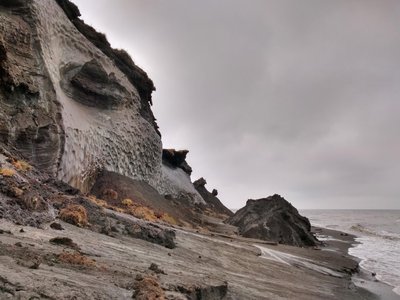In years to come, the Arctic Ocean will absorb less CO2 than expected
The world’s oceans mitigate climate change by absorbing roughly 30% of anthropogenic greenhouse gases from the atmosphere. But that percentage is now being affected by the impacts of global warming, e.g. by the erosion of permafrost soils on the coasts of the Arctic Ocean, an aspect that substantially reduces the seawater’s ability to absorb CO2. Dr. David Nielsen and his team have now shown in climate models for the first time how significant this effect could be in the future. Their study has just been published in the journal Nature Climate Change.
According to the study, for every year and every degree Celsius the global temperature rises, the Arctic Ocean will absorb between one and two million metric tons less CO2 from the atmosphere than previously assumed. That amounts to one-tenth of the emissions produced by road traffic in Europe every year.
When stretches of coastland that have been frozen for millennia thaw and crumble, massive amounts of soil and sediment are released into the ocean. How these particles react to the seawater depends on their composition, but in all cases their organic components increase the water’s carbon content, reducing its ability to absorb CO2 from the air – by between 10 and 15 percent for the Inner Arctic Ocean, as the team calculated.
“We should be grateful that our oceans absorb a major percentage of our greenhouse gases,” says climate researcher Nielsen. “But this ecosystem service might not always continue to be as strong as it has been in the past. To determine whether or not we can keep counting on this effect in the future, we need to first understand the mechanisms of CO2 absorption in more detail.”
Nielsen’s study deepens our understanding of the influence of permafrost coastal erosion. As a result, this factor can be better reflected in future climate forecasts and carbon budgets. For example, the rate of erosion could double or even triple by 2100. Accordingly, the team analyzed various coastal erosion scenarios based on different levels of success for global climate protection initiatives.
Original publication
Nielsen DM, Chegini F, Maerz J, Brune S, Mathis M, Dobrynin M, Baehr J, Brovkin V, Ilyina T (2024): Reduced Arctic Ocean CO2 uptake due to coastal permafrost erosion; Nature Climate Change; https://www.nature.com/articles/s41558-024-02074-3
Contact
Dr. David M. Nielsen
Max Planck Institute for Meteorology
Center for Earth System Research and Sustainability (CEN), Universität Hamburg
Cluster of Excellence “Climate, Climatic Change, and Society” (CLICCS), Universität Hamburg
Email: david.nielsen@mpimet.mpg.de
Stephanie Janssen
Public Relations / Outreach
Universität Hamburg
Center for Earth System Research and Sustainability (CEN)
Cluster of Excellence “Climate, Climatic Change, and Society” (CLICCS)
Email: stephanie.janssen@uni-hamburg.de
Tel: +49 (0) 40 42838 7596

